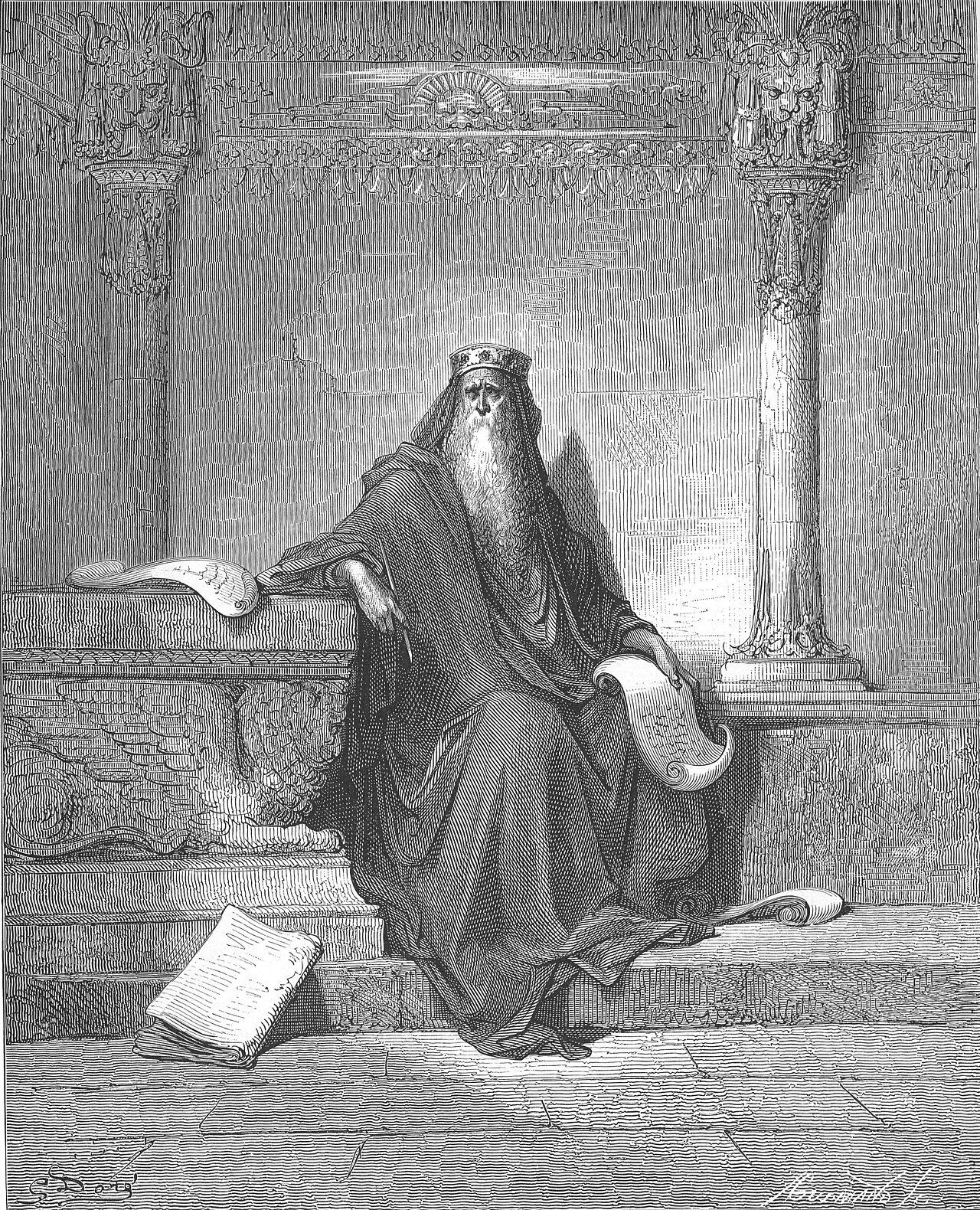
It's Saturday, April 27, 2024.
Today’s edition covers the oral arguments in a Supreme Court case against Idaho’s abortion law, the Medieval book The Imitation of Christ, the debate about who wrote Ecclesiastes, and much more.
Hey, I need your input! Would you be so kind as to take two minutes to complete this survey?
Of Christian Concern
IDAHO ABORTION “BAN” CHALLENGED IN U.S. SUPREME COURT

Supreme Court of the United States (Leandro Paes Leme)
The federal government is challenging Idaho’s “near-total ban on abortion” in the U.S. Supreme Court, which heard oral arguments on Wednesday.* While Idaho’s law allows abortion to save the life of the mother, the federal government claims it violates federal law by restricting abortions in the case of other emergencies.
Federal law requires emergency rooms to stabilize patients with urgent medical issues. Idaho’s lawyer Josh Turner argued the state law does not violate this federal law, as it allows abortions not only if death is “imminent” but also if a medical problem “is likely to lead to her death.”
For context, abortion is “unlikely to prolong, much less save the life” of a mother—and that’s a 1967 quote from pro-abortion Alan Guttmacher, who succeeded Margaret Sanger as Planned Parenthood’s president. This admission highlights that the irrelevance of abortion to saving mothers’ lives has been widely known for decades, even by pro-abortion advocates.
Liberal and conservative justices raised competing concerns during Wednesday’s court session. Read The New York Times’ report here.
___________
*SIDE NOTE: “Near-total ban” is always a misnomer, since no state outlaws self-managed abortions, which are the most common type since 2020.
Also Noteworthy

Finnish politician Päivi Räsänen is in legal trouble for promoting a biblical view of sex and marriage.
→ The Biden administration expands Title IX—the law which prohibits sex-based discrimination in schools—to include “sexual orientation” and “gender identity.” The change may have far-reaching implications.
→ A former politician in Finland, Päivi Räsänen, who is charged with hate speech for promoting a biblical view of sex and marriage on Twitter and in a pamphlet, will stand trial a third time, Supreme Court of Finland confirmed last week.
→ Over 150 churches have been damaged during the ongoing war in Sudan between two factions, neither of whom are friendly toward Christians, USCIRF reports.
→ Religious violence against Christians in Nepal is trending upward as Hindu nationalism grows, International Christian Concern reports.
→ Scotland, it seems, is on both sides of the transgender issue. While it’s been in the news recently for a widely criticized law that prohibits speech against transgender people, it has now also prohibited puberty blockers for transgender minors. | Also in Scotland, 77% of the responding public disagrees with a proposed bill to create “the world’s most extreme buffer zone” around abortion clinics.
___________
Photo above: © Lauri Heikkinen, valtioneuvoston kanslia, Toimiva ja kestävä hyvinvointiyhteiskunta -reformipöytä, 8 May 2023, Finnish Government. (CC BY 2.0 DEED)
Content Catch-Up
Recent, notable content by Christian creators, or of Christian interest.*

Cover art of Josh Garrels’s recent single “Watchman”
→ The Watchman: Christian singer-songwriter Josh Garrels’s latest tune, which he recently discussed on John Eldridge’s Wild At Heart Podcast, voices the heart of the Christian waiting through troubled times for the fulfillment of God’s promises. (Song)
→ Passover Haggadah Guide: The Messianic ministry One For Israel released a guide for how Christians may practice Passover, which began on Monday. (Guide)
→ What Side Are You On?: The Christian Mission to Gaza challenges readers with this question in their latest blog post. (Article)
*Not necessarily an endorsement
Church History Tidbit
The Imitation of Christ

A portrait of Thomas à Kempis, purportedly from 1460. (Public Domain)
Published 606 years ago (in 1418), The Imitation of Christ is a four-book work exhorting “all believers to humbly—and happily—submit [to God] with their whole being.” The book was penned by a “German-Dutch monk and scribe” named Thomas Hemerken of Kempen, also known as Thomas à Kempis (1380-1471).
Scholars suppose it is actually the original of work of two or three men which Thomas translated from Netherlandish into Latin and composited into the kind of “spiritual diary” that he published. It is allegedly “the most widely read and translated book in the world” after the Bible. While that claim seems suspect today, it may have been true at one time in history.
Here’s a brief synopsis of each part.
Book I: Useful Admonitions for a Spiritual Life — Exhorts believers to shun “the vanities of the world” and pride, and to “appreciate…obedience, adversity, and solitude”
Book II: Admonitions Concerning Interior Things — Paints a portrait of the Christian life as renouncing everything and taking a lowly place
Book III: Of Internal Consolation — Contrasts the natural man with the godly man
Book IV: Of Devout Exhortation to the Holy Communion — Meditates and instructs on the topic of the sacrament of communion (from a decidedly Catholic perspective)
Here’s an excerpt from Book II, Chapter Eleven:
JESUS has always many who love His heavenly kingdom, but few who bear His cross. He has many who desire consolation, but few who care for trial. He finds many to share His table, but few to take part in His fasting. All desire to be happy with Him; few wish to suffer anything for Him. Many follow Him to the breaking of bread, but few to the drinking of the chalice of His passion. Many revere His miracles; few approach the shame of the Cross. Many love Him as long as they encounter no hardship; many praise and bless Him as long as they receive some comfort from Him. But if Jesus hides Himself and leaves them for a while, they fall either into complaints or into deep dejection.
Those, on the contrary, who love Him for His own sake and not for any comfort of their own, bless Him in all trial and anguish of heart as well as in the bliss of consolation. Even if He should never give them consolation, yet they would continue to praise Him and wish always to give Him thanks. What power there is in pure love for Jesus — love that is flee from all self-interest and self-love!
The Bible, Briefly
Who Wrote Ecclesiastes?

King Solomon in Old Age by Gustave Doré (1866), depicting a primary contender for the title of Ecclesiastes’ author. (Public Domain)
“The words of the Preacher, the son of David, king in Jerusalem.” (Ecclesiastes 1:1)
The author of the book of Ecclesiastes is identified in the first verse by the Hebrew title קהלת (Qohelet, meaning “assembler,” from the verb קהל, qhl, “assemble”). English translators have often rendered this term as “the Preacher” (assuming a religious assembly is in view) or “the Teacher” (not assuming a religious assembly). Other scholars don’t like either translation.
Either way, it’s traditionally been thought that Qohelet is a nickname for King Solomon. There are a few reasons for that. But, on the other hand, starting in the nineteenth century, “most scholars today shy away from Solomonic authorship.” Here’s some (not all) of the evidence for each side, in five parts:
1.
It’s probably not Solomon: Scholars struggle to imagine why Solomon would use a nickname. To hide his identity? Does it add something to the book? As one scholar puts it, perhaps Qohelet adopts a Solomonic persona “for literary and communicative purposes,” but uses the nickname to establish “distance from the actual person.”
It probably is Solomon: Qohelet is called “the son of David, king in Jerusalem” (1:1). Solomon was literally David’s son and became king after him, so that would seem to fit. The reference to קהל (“assemble”) seems to allude to Solomon’s assembling Israel at the temple dedication (1 Kings 8:1-2, 14, 22, 55).
2.
No, it’s not Solomon: The Hebrew in the book is unusual, leading some scholars to conclude the book was either translated from Aramaic (whereas Solomon would have written in Hebrew) or written in late Hebrew (i.e., later than the Hebrew that Solomon would have used).
Yes, it’s Solomon: If Ecclesiastes were originally written in Aramaic, some of the wordplays in the book would apparently not work (e.g., in 7:1, there’s a play on words in Hebrew that wouldn’t work in Aramaic). Some linguistic studies (like this one) have opposed the idea that the Hebrew of Ecclesiastes is necessarily later than what Solomon would have used.
3.
It couldn’t have been Solomon: There are “two apparently Persian words” that make an appearance in the book, which may be strong evidence that “the book was written in or after the rise of the Persian Empire.”
It still could have been Solomon: The two “Persian” words may actually be Sanskrit. Even if they are “Persian,” they may be pre- Persian Empire (“Persian influence and vocabulary spread…long before…the Persian Empire”).
4.
I’m telling you, no: In 1:12, Qohelet says he “was king in Jerusalem,” which would be odd for Solomon to say, since he would have still been king when he wrote the words (he was king until his death).
I’m telling you, yes: The perfect tense “was” in the phrase “was king in Jerusalem” could be explained simply by an aged Solomon reflecting on his life.
5.
Nuh-uh: The allusions to Solomon seem to disappear after the first two or three chapters, suggesting the author used a Solomonic persona as a literary device primarily to introduce the book and establish his alignment with wisdom.
Uh-huh: While “clear allusions” to Solomon no longer appear after chapter 2, that’s not unusual—it’s not an autobiography! (Ecclesiastes’ genre is, in fact, “wisdom literature.”)
So, what do you think—and why?
This brief survey is barely an introduction to this topic. Dive deeper with the resources below.
____________
1. A scholar who thinks it’s not Solomon: Tremper Longman, The Book of Ecclesiastes (The New International Commentary on the Old Testament) (Grand Rapids, MI / Cambridge, UK: William B. Eerdmans Publishing Company, 1998), accessed via Kindle sample.
2. A scholar who thinks it is Solomon: Duane A. Garrett, Proverbs, Ecclesiastes, Song of Songs (The New American Commentary) (Nashville: Broadman Press, 1993), 254-267, accessed via Internet Archive.
3. A scholar who’s undecided (Is that allowed??): Douglas Sean O’Donnell, Ecclesiastes (Reformed Expository Commentary) (Phillipsburg, NJ: P&R Publishing, 2014), accessed via Kindle sample.
What did you think of today’s briefing?


Know someone who would enjoy this?Please SHARE this newsletter




Have some feedback for me? Reply to this email with comments or suggestions. I’d love to hear from you!
Why "18:15"? The name Project 18:15 is based on Proverbs 18:15: “An intelligent heart acquires knowledge, and the ear of the wise seeks knowledge.” The aim is for this weekly email—a Christian news briefing, a Bible study, and a Church history lesson rolled into one—to be one way you keep abreast of current events and acquire knowledge you might not acquire elsewhere.
Unless otherwise indicated, all Scripture quotations are from The ESV® Bible (The Holy Bible, English Standard Version®), copyright © 2001 by Crossway, a publishing ministry of Good News Publishers. Used by permission. All rights reserved.

Copyright (C) " target="_blank">unsubscribe.
